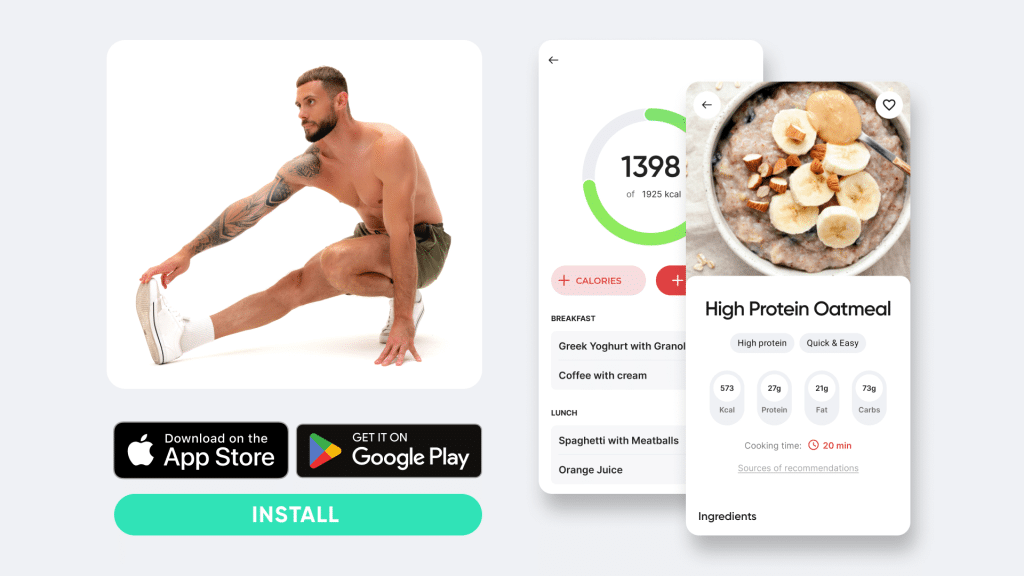If you’re a male struggling with weight loss, you are not the only man on the street corner. In fact there has been a global rise in obesity. On top of that, this problem calls for a sustainable approach to diet.
Note that a sedentary lifestyle may sometimes be the biggest culprit behind obstinate weight. Whatever the case, we have good news for you!
You can lose weight now and say goodbye to stubborn fat, with intermittent fasting. It is a dietary strategy endorsed by fitness experts for its potential health benefits. For instance, men who have adopted intermittent fasting often report increased energy levels and improved weight management (8).
If a shortage of time doesn’t allow you to join a gym, intermittent fasting may help solve your weight-related issues. When looking for a men’s health guide to intermittent fasting, you might face some difficulties. We are here to address just that.
In this article we have laid out the principles of intermittent fasting. These are followed by tips on how men can use this regime to improve their lives.
What is Intermittent Fasting?
As the name implies, intermittent fasting is the cyclic eating and fasting pattern throughout the day or week. The goal is to control your cravings by eating wholesome meals at set intervals. A good aspect of intermittent fasting is that you don’t need to cut down on specific food groups like carbs. Rather than that, you consume balanced meals at set intervals.
When we do intermittent fasting for weight loss, we hope to reduce our cravings and avoid snacking or binge eating. By consciously planning our meals for the entire day we can focus on consuming meals packed with nutrients and fine-quality ingredients that provide nutrition and satiate us.
The fasting period can be from 8 to 24 hours. There are also alternate-day fasting and Warrior Diets styles, which will be explained later in the article.
If you’ve mustered up the courage to crush your weight loss goal, let Betterme take the sting out of this demanding process. Our app will help you restructure your habits, remold your life and crank up your fitness results!
Is Intermittent Fasting Good for Men?
Many fitness experts recommend intermittent fasting for men, to enhance their fitness goals. According to a 2019 review, men who fasted for 16 hours, along with resistance training showed fat loss while maintaining muscle mass over 2 months (4).
Here are some more benefits you can avail yourself, whether you are following a men’s version of intermittent fasting or a general intermittent fasting plan:
Can Promote Weight Loss
Intermittent fasting can be an effective way to lose weight. . A 2014 review compared intermittent fasting (IF) to traditional calorie restriction (CR). Both methods were found to produce weight loss. Although CR seemed to result in greater weight loss, similar reductions in visceral fat were seen (9).
May Help Prevent Diabetes
Some studies have found that intermittent fasting improved various biomarkers associated with type 2 diabetes risk. That said, more research will be needed to draw meaningful conclusions. (9, 11)
Might Promote Heart Health
Intermittent fasting may be particularly effective at maintaining heart health. Some research suggests it may positively affect some of the factors that contribute to heart disease, such as high blood pressure and cholesterol (7).
May Reduce Inflammation
Intermittent fasting may also combat oxidative stress and reduce inflammation (10). Oxidative stress occurs when free radicals damage your DNA. This may accelerate the aging process and contribute to the development of chronic disease.
Can Boost Energy Levels
Intermittent fasting might also refresh your energy. On its surface, fasting may seem tiring, but quite a few people find that it instead increases their energy levels. Our bodies have to rely on stored fuel sources to get power when fasting, an effect that people can experience differently.
The versatility of intermittent fasting allows men to tailor their fasting schedules to suit their lifestyles. Combining this with a balanced diet can be valuable for men striving to achieve their health objectives.
How Long Should Men Intermittent Fast?
Fasting is not limited to a set time or interval. Below, we have rounded up the six types of fasting through which men can do intermittent fasting:
12-hour Fasting
If you are a beginner, you should start with a 12-hour fasting period. This involves avoiding eating or drinking for 12 hours and consuming wholesome meals after breaking your fast. This pattern is intended to cause your body to convert your fat stores into energy.
The best way to do a 12-hour fast is by initiating it near your bedtime. For instance, you could start your fast at 11 p.m., go to sleep, and then have breakfast at 11 a.m. This way, you are not likely to experience negative effects, and your body will get used to breaking down fat.
Read more: 12-Hour Intermittent Fasting For Weight Loss And Other Benefits.
16-hour Fasting
If 12 hours are too easy for you, you can do a 16-hour fast. The 16-hour fast is the most common intermittent fasting schedule. Here, you do 16 hours of fasting and leave 8 hours of eating period. This method is also known as 16:8 intermittent fasting.
In the 16:8 intermittent fasting method, you can have dinner at 8 p.m. and skip breakfast the next day to eat your first meal around noon.
2-day Fasting
If you are used to 16-hour fasting, you may opt for 2-day fasting or the 5:2 fasting method. This is a good option for men looking to make their eating habits healthy. During the 5:2 diet, men consume healthy balanced meals for five days of the week and then limit their caloric intake on 2 nonconsecutive days. On fasting days, people typically limit themselves to 25% of their usual calorie needs or around 500 calories.
24-hour Fasting
A 24-hour fasting period lasts up to two days. It is also known as the eat-stop-eat routine, where individuals eat no food for 24 hours straight. You can either eat from lunch to lunch or breakfast to breakfast.
While strict, you can consume water, black tea, or coffee to sustain your body. Consuming wholesome meals to nurture your body during the eating window would be best. While the 24-hour fast sounds appealing and effective, it is extreme and may lead to headaches and fatigue (14).
Alternate day fasting
The most popular, yet strict fasting method, alternate day fasting, can reduce weight. During alternate-day fasting, you eat normally one day and consume up to 500 calories the next day, alternating between normal eating and fasting days. Research has found that alternate-day fasting can lead to weight loss and improve some heart health-related markers (1). .
Warrior Diet
Warrior diet is an extreme kind of intermittent fasting that follows a 20-hour fasting and 4-hour eating period. This method might suit individuals who have already tried other routines.
Considering the short eating window, you must consume healthy balanced meals and wholesome foods to sustain your body throughout the rest of the day.
Dry Fasting
A dry fast is where men completely forgo eating and drinking for extended periods. The motive is to push the body into getting energy from stored energy sources.
There are two types of dry fasting: soft and hard dry fasting. A soft dry fast is the one in which men can wash their hands, take a bath, or go swimming, whereas a hard dry fast is the one in which men completely avoid coming in contact with water.
Dry fasting is dangerous and not appropriate for everyone (12). If you have medical conditions or are a beginner, you must avoid extreme fasting as it affects your mental and physical well-being.
These were some of the most common and effective fasting routines. Fasting is not appropriate for everyone. Always consult with a healthcare provider before attempting any type of fasting regimen. Start with the 12-hour and then gradually proceed to 16-hour, 24-hour, or alternate fasting if you desire. Remember, your health is important so you must follow a routine that suits your needs. If you experience any difficulty or health issues, immediately consult your doctor.
How Should Men Start Intermittent Fasting?
Before starting any diet regime it is essential to understand how it can impact your health. Always consult with a healthcare provider before attempting any type of fasting regimen.. Some things you need to remember are:
Plan Ahead
Intermittent fasting is all about eating healthy. It would be best if you planned your weekly grocery shopping. Ensure you have all the necessary vegetables and ingredients to cook wholesome meals.
Avoid Sugars
Do not make the mistake of consuming a lot of ultra processed foods. You may not enjoy the benefits if you fast and drink sugary drinks. Instead, consume whole foods like fruits, vegetables, lean proteins, and healthy fats. Avoid beverages and ultra processed foods high in sodium and added sugar.
Opt for Healthy Snacking
You may get the urge to snack during your eating window. Prepare healthy snacks free of added sugars to munch on between meal times.
Stay Hydrated
You must also drink lots of fluids, including water and black coffee (if you crave it). Hydration is important and helps you lose weight.
Have a Good Sleep
Sleeping adequately for at least 7 hours can also contribute significantly to weight loss. Going to bed early prevents you from having late-night snacks, and you also wake up refreshed.
Track Progress
Keep tracking your progress. You should check your body weight, measurements, and overall feelings. Adjust your fasting schedule if you want to meet your objectives.
Does Intermittent Fasting Work for Men Over 40?
Absolutely. Intermittent fasting for men over 40 can help them lose weight if done correctly and is appropriate (6).
Men over 40 tend to have more visceral fat around their organs and bellies, an area where it is tough to lose. Fat here can contribute to the development of chronic disease(17). Intermittent fasting can help with fat weight loss, including visceral fat.
Furthermore, intermittent fasting has been seen to help maintain muscle mass during weight loss, especially when paired with resistance training. Since older men face a significant decline in their muscle mass, they can incorporate intermittent fasting and resistance training to keep it. They should focus on eating a high protein diet during their eating windows to help with this as well.
Reasons why BetterMe is a safe bet: a wide range of calorie-blasting workouts, finger-licking recipes, 24/7 support, challenges that’ll keep you on your best game, and that just scratches the surface! Start using our app and watch the magic happen.
What Time Is Best for Men to Fast?
Intermittent fasting can be started anytime, but most people choose to fast overnight. The specific times can be adjusted according to your individual schedule. . For instance, in a 16:8 fasting schedule, men can finish dinner by 5 p.m., fast overnight, and have breakfast at 9 a.m. They can consume all their healthy and wholesome meals from 9 a.m. till 5 p.m.
Consuming healthy meals will help them maintain their health and lose weight effectively. Men who follow a 5:2 fasting method can benefit by eating healthy meals 5 days of the week and choosing 2 days that work best for them to limit calorie intake. The 2 days should be nonconsecutive.
What is the best Intermittent Fasting Schedule for Me?
Every individual is unique, so everyone has different dietary needs. Nonetheless, every male needs adequate proteins, carbs, and nutrients to thrive. Here is an example of a 14:10 intermittent fasting period for you to follow (3):
- Have a banana protein smoothie at 10 a.m. to break your fast.
- Have a burrito at noon.
- Have chocolate date protein balls at 1:30 p.m. as a snack.
- Have a pesto chicken and salad wrap at 3:30 p.m. for lunch.
- Have an avocado and sweet potato salmon as supper at 7:00 p.m (finish by 8:00 pm).
- Have a fasting period till 10 a.m.
Who Should and Should Not Do Intermittent Fasting?
By now, we have established that intermittent fasting might be helpful for men who aim to lose unwanted fat. Bodybuilders, in particular, sometimes do intermittent fasting to lose fat and maintain their muscle mass (13). Whether one should or should not do intermittent fasting depends on some factors, such as people with medical conditions or a history of eating disorders (16). Some medications need to be taken with food at certain times, which is also something to consider.
This approach can be stressful for some individuals, or might not fit well into their lifestyle. It would be best if these people looked for an alternative approach to lose weight. Not everyone enjoys the strict eating windows prescribed by intermittent fasting.
A healthcare provider can help you determine whether intermittent fasting is safe and appropriate.
The Bottom Line
It would be safe to state that intermittent fasting is a popular way to lose weight among men. This process focuses on diet control and disciplines its followers to limit their food intake. For most people, intermittent fasting offers a convenient way to shed pounds while having their favorite meals. However, some people may like to survey alternative diet methods to meet their fitness objectives.
The key to successful fasting lies in a balanced approach. You should understand your health requirements and create a customized diet plan. The best practice is the one that fits seamlessly into your lifestyle and doesn’t look like a burden!
Read more: How Much Weight Can You Lose in a 24-Hour Fast?
Frequently Asked Questions (FAQs)
Does fasting boost testosterone in men?
Very few studies have been conducted on this, however one recent review on the topic found that intermittent fasting reduced testosterone levels in lean, physically active, young men, although the reductions in testosterone did not affect muscle mass or strength (5).
Why is 16 hours the magic number for fasting?
The 16:8 fasting method is the most popular. During this routine, fasting is thought to promote autophagy, where old and worn cells and organelles are broken down and replaced by new ones.
Can you eat anything while intermittent fasting?
The idea is not to eat anything during your fasting window. You can have zero-calorie drinks like water to stay hydrated. That said, there are certain extreme fasting methods, like hard dry fasting, where you are not allowed to come in contact with water.
Can you skip breakfast during intermittent fasting?
Your body needs energy to start the day. If you skip breakfast, you may experience hunger pangs and are prone to eat more during the day. It may be a good idea to align your fasting schedule so that your first meal isn’t too late in the day. .
Does fasting affect testosterone?
There have been very few studies done on the subject, however the evidence we do have at this time suggests that fasting may decrease testosterone levels in men.
What does fasting do to the male body?
Fasting might bring several health benefits to the male body. This includes weight loss, autophagy, reduced inflammation and oxidative stress, and improved metabolic and heart health. It may also promote fat loss while maintaining muscle mass.
What time is best for men to fast?
The best time for men to fast is usually from sometime in the evening to sometime in the morning, following the 16:8 diet. This can help men to stay active and consume healthy meals during the day, while avoiding late-night cravings.
DISCLAIMER:
This article is intended for general informational purposes only and does not serve to address individual circumstances. It is not a substitute for professional advice or help and should not be relied on for making any kind of decision-making. Any action taken as a direct or indirect result of the information in this article is entirely at your own risk and is your sole responsibility.
BetterMe, its content staff, and its medical advisors accept no responsibility for inaccuracies, errors, misstatements, inconsistencies, or omissions and specifically disclaim any liability, loss or risk, personal, professional or otherwise, which may be incurred as a consequence, directly or indirectly, of the use and/or application of any content.
You should always seek the advice of your physician or other qualified health provider with any questions you may have regarding a medical condition or your specific situation. Never disregard professional medical advice or delay seeking it because of BetterMe content. If you suspect or think you may have a medical emergency, call your doctor.
SOURCES:
- Alternate day fasting for weight loss in normal weight and overweight subjects: a randomized controlled trial (2013, ncbi.nlm.nih.gov)
- Are You On Dry Fast? Understand The Types, Benefits And Side Effects (2023, netmeds.com)
- Beginner’s Guide To Intermittent Fasting (2023, mensfitnesstoday.com)
- Effects of Intermittent Fasting on Health, Aging, and Disease (2019, nejm.org)
- Effect of Intermittent Fasting on Reproductive Hormone Levels in Females and Males: A Review of Human Trials (2022, pubmed.ncbi.nlm.nih.gov)
- Guide to Intermittent Fasting for Men Over 40 in 2023 (2023, minimalist-nutrition.com)
- Impact of intermittent fasting on human health: an extended review of metabolic cascades (2019, tandfonline.com)
- INTERMITTENT FASTING AND HUMAN METABOLIC HEALTH (2016, ncbi.nlm.nih.gov)
- Intermittent fasting vs. daily calorie restriction for type 2 diabetes prevention (2014, sciencedirect.com)
- Intermittent metabolic switching, neuroplasticity and brain health (2018, nature.com)
- Metabolic Effects of Intermittent Fasting (2017, annualreviews.org)
- Pituitary-testicular axis in obese men during short-term fasting (1989, pubmed.ncbi.nlm.nih.gov)
- SIMPLE’s guide to intermittent fasting while bodybuilding (2023, simple.life)
- Six ways to do intermittent fasting (2023, medicalnewstoday.com)
- Study finds routine periodic fasting is good for your health and your heart (2011, eurekalert.org)
- The Dangers of Intermittent Fasting (n.d., centerfordiscovery.com)
- What Is Visceral Fat? (2021, webmd.com)











